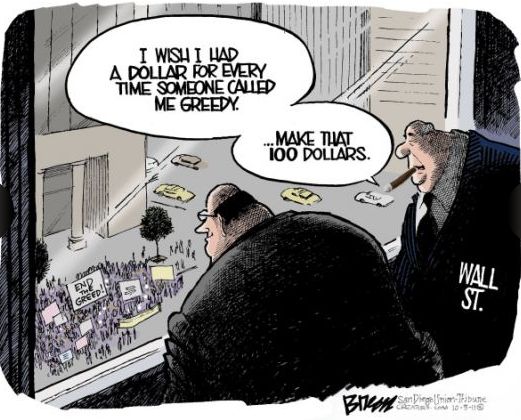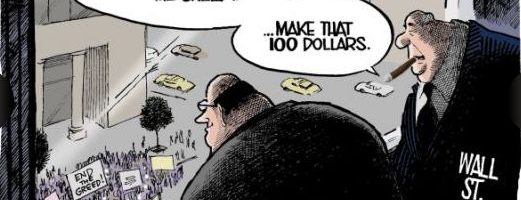The following is a chapter from Money, Sex, Power & Faith.
Order your copy in paperback or for Kindle!
“Nature shrinks as capital grows. The growth of the market cannot solve the very crisis it creates.” – Vandana Shiva, Soil Not Oil: Environmental Justice in an Age of Climate Crisis

When financial giant Bear Stearns started to hemorrhage because the subprime mortgage scheme started to fall apart in 2008, the staggering giant caused a ripple of instability throughout the financial sector, which had long overtaken tobacco as the United States’ key industry. Seven hundred and nine of the most successful financial institutions in the country had to be bailed out after proving themselves not to be as good at their own game as they thought. Unfortunately, the financial industry is essentially based on imaginary scenarios and unsustainable practices that have the potential to deplete the world’s resources in order to put numbers in a ledger. Yet with the way they have come to seemingly dominate our economic system, we seem beholden to their existence.
“Although the essential nature of commerce has not altered since the very first exchange of coin for corn,” Hawken points out in The Ecology of Commerce, “the power and impact of corporate capitalism have increased so dramatically as to dwarf all previous forms of international power. No empire – Greek, Roman, Byzantine, British, or any other – has had the reach of the modern global corporation, which glides easily across borders, cultures, and governments in search of markets, sales, assets, and profits. This institutional concentration of human energy and creativity is unparalleled in history.”
Due to the fact that finance has become the crux of our economy, our economic stability has been teetering for years as value has moved from human labor to speculative finance.
“Finance holds a disproportionate amount of power in sheer economic terms,” writes Rana Foroohar in Makers and Takers: The Rise of Finance and the Fall of American Business. “It represents about seven percent of our economy but takes around twenty-five percent of all corporate profits, while creating only four percent of all jobs.”
Indeed, America has been resolute in enriching the value of the dollar. As the supreme leader in the global financial market, we have a lot riding on the financial system we’ve created. With the debt we’ve developed and the arrogant way we’ve coerced the rest of the world into competitive consumerism, our doubling down on the dollar as the source of our well-being and the true god we serve, we have a lot at stake and seem fully intent to stand until our gamble fully busts.
“While there are other countries that have a larger banking sector as a percentage of their overall economy,” Foroohar explains, “no country beats the United States in the size of its financial system as a whole (meaning, if you tally up the value of all financial assets). In the first half of 2015, the United States boasted $81.7 trillion worth of financial assets – more than the combined total of the next three countries (China, Japan, and the United Kingdom). We are at the forefront of financialization; our financiers and politicians like to brag that America has the world’s broadest and deepest capital markets. But contrary to the conventional wisdom of the last several decades, that isn’t a good thing. All this finance has not made us more prosperous. Instead, it has deepened inequality and ushered in more financial crises, which destroy massive amounts of economic value each time they happen. Far from being a help to our economy, finance has become a hindrance. More finance isn’t increasing our economic growth – it is slowing it.”
Many will point to the whopping size of our GDP as some sort of sign as to how well we’re doing. However, considering that the majority of the profits gained through these games of finance are being absorbed by a very small percentage of the population, that magic number is becoming less and less impressive. In the meantime, Americans who don’t live in gated communities are experiencing stagnant wages and higher costs of living, and many are not even getting their basic needs met.
“For a long time in American society,” says Paul Hawken in The Ecology of Commerce, “a large number of people thought they were advancing under the guidance and direction of commerce. As long as we could identify the improvements in the quality of our existence with the continuing growth and influence of big business, criticism of and dissatisfaction with the system were generally discounted or ignored. But during the past twenty years our standard of living has not increased, real wages have not risen, and, for the very first time since the Industrial Revolution, our work week is getting longer, not shorter – a literally epochal development, barely remarked upon in the press.”
Considering that the majority of the financial industry is based on speculation, it could be said that should America continue in its trend of promoting finance as their key industry, its biggest export will ultimately be bullshit. “Finance, after all, is not a consumer product or service, valued in itself, like a car or a restaurant meal or clothing,” wrote Adair Turner in Between Debt and the Devil: Money, Credit, and Fixing Global Finance. “No one gets up in the morning and says ‘I feel like enjoying some financial services today.’ Finance is a necessary function to enable the production of the goods and services we actually enjoy.”
We have to ask ourselves if it is really all that necessary a function. Considering that its activity requires a vast amount of human energy and natural resources to create goods and services that we might enjoy, but are ultimately harmful to our planet, ourselves, and our future, is it wise to continue worshiping the gods of finance as a our providers?
Order your copy of Money, Sex, Power & Faith today!


